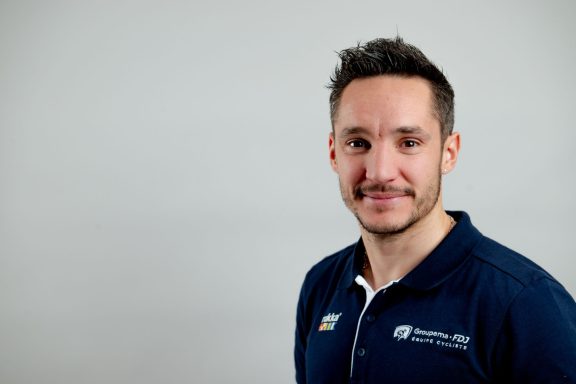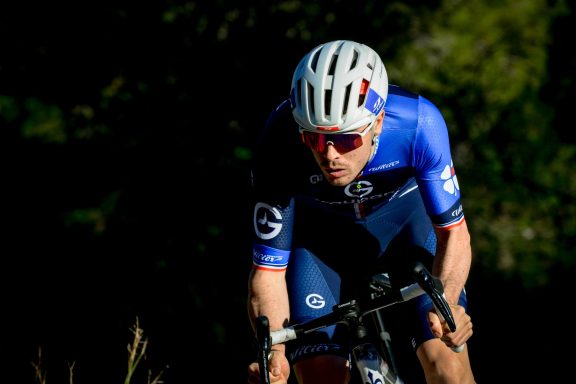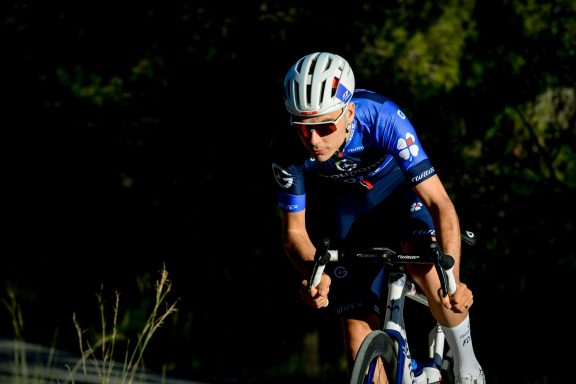Once a rider, then a sports director, Martial Gayant has most recently been taking care of the race organization within the Groupama-FDJ cycling team. The former French cyclocross champion is particularly managing the logistics of the most unpredictable race on the calendar: Paris-Roubaix. In this interview, he tells us about the specificities of the event but also briefly talks about his long career in the cycling world, which is about to come to an end.
Martial, why is Paris-Roubaix such a special race to prepare?
No less than 28 cobblestone sectors need to be covered on the “Hell of the North”. It is a real challenge. However, I learned a lot from my time as a rider, in the 80s and 90s… I often told myself: if I had had a pair of wheels waiting for me at the end of this sector, I would have avoided a lot of chases and would have kept some freshness for the final. As I got to the other side, as a sports director, I wanted a more efficient process to change wheels and to give bottles and gels. We set this up with all my collaborators. Therefore, when the riders approach the cobblestone sector, they know they are safe because staff members are there to assist them if something unfortunate happens. This requires having people on the entire 257-kilometre course. On average, one person covers three cobblestone sectors, and every person has defined zones and times. The first would be in the region of Cambrai, the second around Mons-en-Pévèle, and the third near Orchies or Roubaix.
“You never change a winning team”
How does the team organize this battle plan?
We don’t just rely on staff members. Some long-time friends and some supporters come to us, willing to have a pair of wheels at the end of a sector or another. We have absolutely no problem finding well-intentioned, kind people. So much so that they sometimes come from Belgium to get involved in our organization. Basically, my team is made of about twenty persons on the day of Paris-Roubaix. Everyone plays their part at their own position. We are used to this way of working and it all goes simply: they all know their route by heart, they know how to go from one place to another, they know where they can park. You never change a winning team, and they have full autonomy to be in the right place twenty to thirty minutes before the riders. I send a recap email after the recon, which corroborates what we know, and we also have a group to gather the press releases from the organizer or the jury.
What about equipment?
Nowadays, if we want to race Paris-Roubaix in good conditions, we need sixty pairs of wheels. This is obviously the race where we need them the most. If there are no punctures or crashes on Paris-Roubaix, then it is not Paris-Roubaix. The riders take many risks to stay in competition, so the danger is always there. We also pay great attention to the sports directors’ cars. If you crush the universal joint, you lose all the oil box and your engine is dead. It’s happened twice before. But there is a plan B: I am there, not far away, to take over as a sports director and to support the riders until the end. I actually already substituted Marc, who arrived on a tow truck two hours after the velodrome closed! It is the only time he finished Paris-Roubaix after the time limit (laughs). To avoid any issue, we also place a steel plate under the front wheels to protect the engine from any impact. The cobblestones sectors are sometimes very bumpy, so a wrong trajectory is enough to tear everything off…
How long prior do you start planning Paris-Roubaix?
At the moment, given the health situation, we only focus on it the week before the race. There is a good reason for it: many people can call me in the last moment to tell me that they have caught the Covid. Obviously, there is some work done in advance, but the cobblestones sectors don’t change much, and more than anything, I have great confidence in the people that surround me.
“I made sure to adapt in order to better anticipate”
How has your role evolved within the team in the past seasons?
About ten years ago, someone asked me how I imagined my position developing. I remember saying that I would see myself as a captain with binoculars in terms of race organization. I said it because I felt there were some breaches in that matter. When you want to grow on a large scale, you must above all things have good foundations. I loved my job as sports director, I loved sharing and confronting myself with the staff and riders, but there came a time when someone was needed in this spot so that the team could develop. I volunteered, for the interest of the team. I did not have the training for this kind of job, but I took this role head-on, as a self-taught man, and told myself that the only purpose was to move the ship forward together with my co-workers. My eleven years as a pro at the highest level taught me a lot. I was able to point out the issues from the field and to implement certain things in order to deal with all the risks. The 80s certainly have nothing to do with 2022, but I made sure to adapt to changes in order to better understand but also better anticipate. That’s also what binoculars are for.
What are the main issues you’ve had to deal with?
For the past two years, it mostly has been to fix all problems relating to the Covid. Since January 1, around forty members of the team have had it. It gets really tricky when, for example, you have to replace a bus driver at the last moment. My role is actually to sort the shit out, we can say it like that (laughs)! You don’t just have to do something about it, you need to be responsive on D-Day. In this position, you need to take your responsibility straight away so that everyone is operational in the field in due time. My goal is to avoid any minor glitch. The workload has obviously intensified since the Covid. I plan my projects like before, with a team of twenty to thirty people, ten cars or so, a certain number of bikes etc… This is the priority, but I also must think of an alternative plan in case something goes wrong. You always need a plan B, and that means a lot of time spent on the phone (smiles).
Is it also satisfying to contribute to the team’s functioning in this way?
As a cyclist, then as a sports director and today in my position, I’ve let my feelings guide me. Some might say that I don’t have to handle this sort of thing at sixty, but my curiosity and the challenges made me take on this new role. Without challenges, I get bored. From this point of view, we certainly got a big one when the Covid occurred in March 2020. We had to restart in June-July in order to be ready in August for our first races. It was a real challenge to establish a program over three months and fifteen days, which included the three Grand Tours and all the Classics. It was intense, for sure, but when you make it to the end and carry it out, it is even more enjoyable. Besides, we had a very good end to the season that year. These kinds of challenges fed me and kept me going forward.
“I have never regretted anything”
Do you miss the races from time to time?
Obviously, but it’s always a pleasure to come back to the Classics to give a hand and bring my knowledge. I have also been stunned in the last races, the riders really gave us a lot to be satisfied about. However, I prefer to look ahead than behind. Obviously, my job has changed a lot over these twenty years. We needed to fill some gaps, and organization has always been part of my DNA. I also remember having lunch with Marc in an airport cafeteria after a race, when we were pros. He said, “Who pays?”. And I said: “It is on me, don’t worry”. When we left the table, Marc told me: “When I build my own team, I will take you as manager”. It was in the 80s, and the story is still on today.
Do you have a particular memory with the team?
My little pride, as a sport director, is to have conducted the briefing at the French championship nine times, and to have come away with seven victories (smiles). However, this tally was only made possible thanks to the great times of friendship and humanity we shared with the riders in the week leading to the race. They listened to us and had confidence in our way of approaching the race. When the cards were on the table, everyone played along. When I was sports director, I often said to the guys: “I wrote the scenario because I know what can happen, I lived it myself. You are the actors. If I chose you, it means you have the qualities to play your part. Together, we can make a beautiful film, people will enjoy it and will get their money’s worth. Think of the kids staring at you being starry-eyed, and don’t forget you’re behind this movie”. This is what cycling is, for ages. This is the message that we should continue to spread.
How do you feel a few weeks before your retirement?
I am fully satisfied with the way I approached my life and I have never regretted anything. I’ve always made well thought out decisions. Having competed at a high-level, I also learned to listen to my body and my head. Today, I listened to my head and told myself that I had covered it all. I already have a successor in the making. He sometimes comes to the office to work alongside me. Just like when I was a rider or a sports director, I always liked to share, and I always liked helping others.



No comment